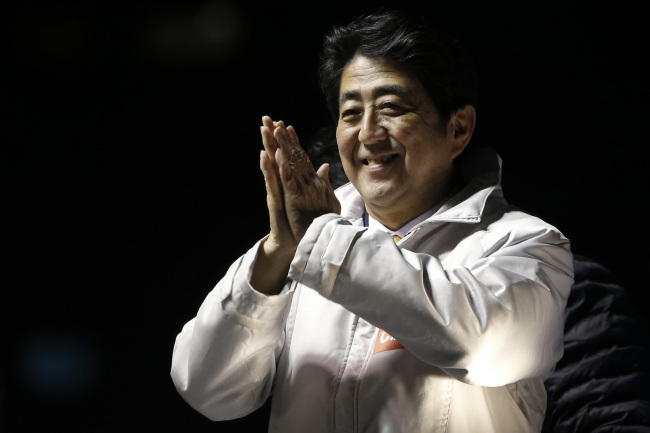Abe victory means gain for big firms, pain for smaller ones
By Korea HeraldPublished : Dec. 22, 2014 - 21:17
Japanese Prime Minister Shinzo Abe’s victory in elections this month, an endorsement of his economic policies, may help the nation’s biggest companies get richer while extending a surge in bankruptcies among smaller ones.
Toyota Motor Corp. and Honda Motor Co. are expected to post record profit this year after the policies known as “Abenomics” weakened the yen, boosting their earnings from overseas. Aggregate net income at 196 of the largest listed companies will rise to a record 18 trillion yen ($151 billion) this fiscal year, based on analyst estimates compiled by Bloomberg.
Toyota Motor Corp. and Honda Motor Co. are expected to post record profit this year after the policies known as “Abenomics” weakened the yen, boosting their earnings from overseas. Aggregate net income at 196 of the largest listed companies will rise to a record 18 trillion yen ($151 billion) this fiscal year, based on analyst estimates compiled by Bloomberg.

At the same time, the number of Japanese companies citing the weaker yen among the reasons for going bankrupt has almost tripled this year as surging costs of imported food, metals and construction materials squeeze small businesses, according to Teikoku Databank Ltd. Japan may see a continued rise in such bankruptcies, especially of small companies outside large cities, the research company estimated.
“There’s a huge gap between the big exporting companies and smaller companies,” said Takeshi Minami, chief economist at Norinchukin Research Institute. “Abenomics is designed to create a strong economic structure in which the strong survive and the weak go away.”
Small and mid-size businesses account for about 32 million jobs in Japan, more than double the 14 million offered by big companies, which mostly gain from currency depreciation, according to a 2014 report by an agency at the Ministry of Economy, Trade and Industry.
When Abe took office in 2012, Uchida Co., which supplies molds to automakers, bet on growth by building a new factory. Two years later, the company isn’t profitable. Indeed, Abenomics may yet put the company out of business, said Takumi Tanaka, Uchida’s senior managing officer.
The yen’s 28 percent plunge versus the dollar under Abe has pushed up costs for imported materials, while a sales tax increase and a 16-month decline in real wages have stymied domestic demand at Uchida’s customers, including Honda. Japan’s economy is in its fourth recession since 2008, even as the weaker yen spurred a record stock rally.
“We expected that Abenomics would help both big companies and smaller suppliers like us, so we invested 800 million yen to build a new factory,” Tanaka said in an interview. “We dug a deep pit of risk, and now we keep waiting in the hole for the economy to get better.” (Bloomberg)
-
Articles by Korea Herald







![[New faces of Assembly] Architect behind ‘audacious initiative’ believes in denuclearized North Korea](http://res.heraldm.com/phpwas/restmb_idxmake.php?idx=644&simg=/content/image/2024/05/01/20240501050627_0.jpg&u=20240502093000)











![[Today’s K-pop] Sunmi to drop single next month](http://res.heraldm.com/phpwas/restmb_idxmake.php?idx=642&simg=/content/image/2024/05/03/20240503050545_0.jpg&u=)